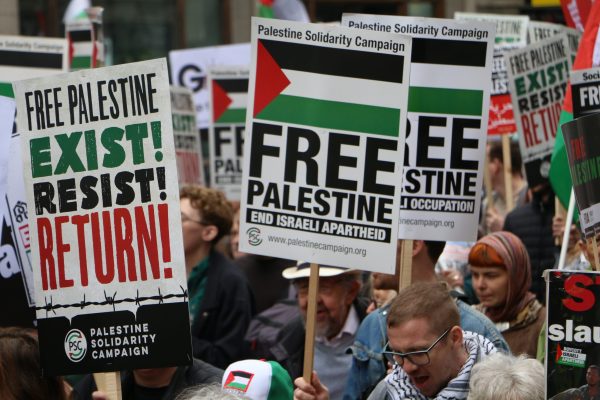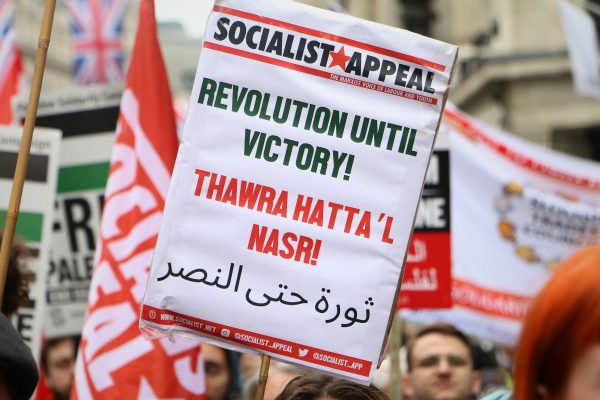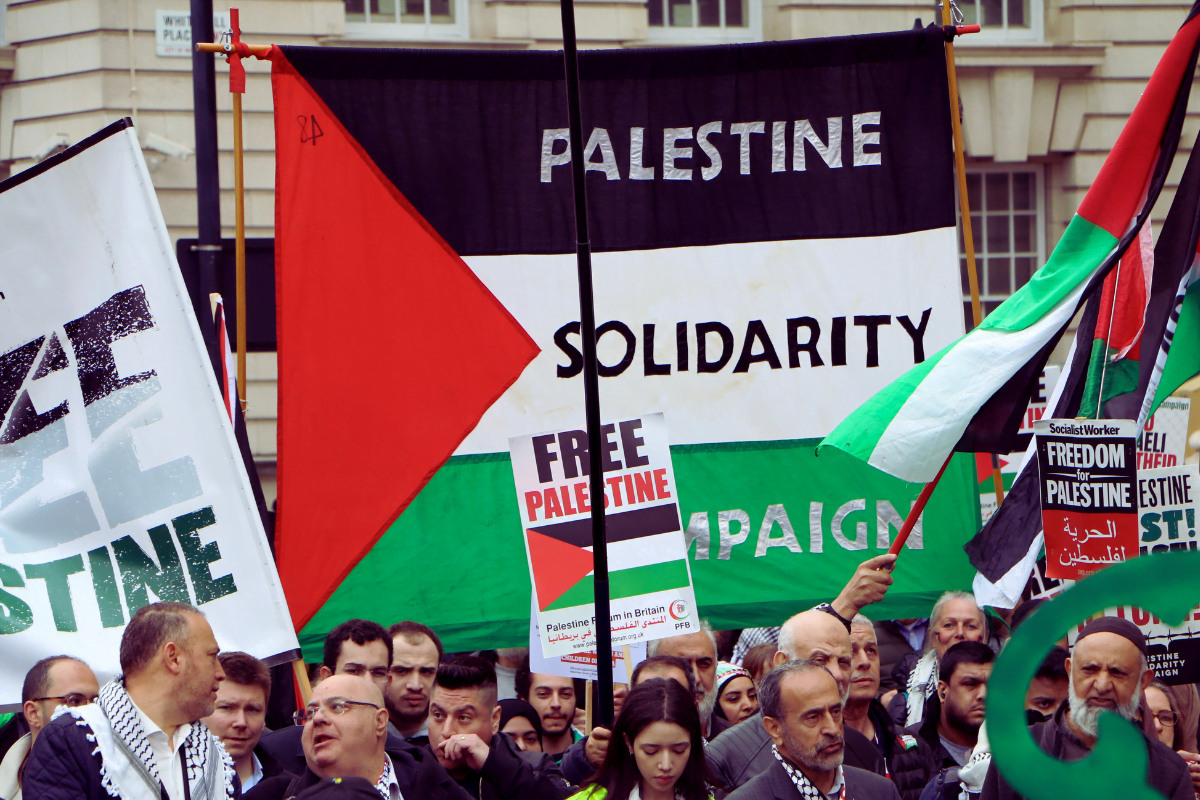Marxists stand in full solidarity with the Palestinian masses against the brutal expansion of the Israeli state.
The disenfranchisement and expropriation of millions of Palestinians has created a state built through ethnic cleansing, reliant on the support of imperialism.
As the Israeli state develops its own imperialist interests, it expands even further into Palestinian territories, murdering and stealing from workers, all in the service of Israeli capitalism.
Ultimately, we understand that only a socialist revolution offers any hope for a meaningful solution to the problems in the Middle East.
But many genuine workers and youth, both in Palestine and internationally, are rightfully disgusted by the crimes of the Israeli regime. They do not want to sit around ‘waiting for the revolution’. They want to act!
For those who believe that ‘something must be done now’, the Boycott, Divestment, Sanctions (BDS) campaign is appealing, offering an easy way to take a moral stand and punish Israel for its crimes.
But we must assess whether this tactic actually does anything to liberate Palestinians.
Should Marxists support such consumer boycotts and calls for ‘international pressure’ to turn Israel into a ‘pariah state’? What can Marxists internationally do to show solidarity with the Palestinian masses? And how can the struggle against imperialism in the whole region be advanced?
Order your copy of ‘Israel-Palestine: A Revolutionary Way Forward’ – our new pamphlet from Wellred Books – here.
We are proud to announce a new series of in-depth articles on the topic of Israel-Palestine, putting forward a revolutionary perspective for Palestinian liberation, and lasting peace for the whole region.https://t.co/hQvLm0QjDB
— Socialist Appeal (@socialist_app) April 29, 2023
Consumer boycotts
The Palestinian Solidarity Campaign in the UK provides a useful example. One strand of their strategy calls on people to pledge to “never knowingly buy Israeli goods until Israel complies with international law and recognises Palestinian rights”.
By doing so, it is argued that this will exert “moral and economic pressure on Israel to comply with international legislation and principles of justice”.
Similar consumer boycotts that have been carried out, however, have done the exact opposite.

Zionism rallies Israeli workers behind the banner of their own ruling class, against the Arab ‘enemy’. The Israeli state manipulates the Jewish working class with the myth of a ‘fortress Israel’ that must be defended at all costs.
In fact, in this way, the Israeli ruling class actually benefits from consumer boycotts, providing evidence that they can cynically point at to show that ‘the whole world is against us’.
This distracts from the pressing issues of poverty, poor housing, and unemployment that exist amongst Jewish workers in Israel.
Israel’s anti-boycott laws, passed as a direct response to BDS, have recently been turned inward to crack down on anti-government protestors within Israel, for example.
If anything, the boycotts have worked out in the state’s favour.
The idea of boycotting ‘anything with an Israeli bar code’ also gives the illusion that the problem is simply one of Israeli companies, saying nothing about the question and role of imperialism – that is, the role that the US and British capitalists, for example, play in supporting the Zionist state.
Admittedly, people do not believe that the ice cream they eat is going to stop the plight of the Palestinians. That would be a trifle.
But behind failed consumer boycotts of companies like Ben & Jerry’s is the idea that if everyone ‘voted with their wallets’, Israel could be convinced to adhere to ‘principles of justice’.
This completely misses the point. The morality of the capitalists always reflects their own class interests.
Though the oppression of Palestinians is draped in religious language in Israel, in order to justify its brutality, it is in the interest of the Zionist ruling class to continue their land grabs and occupation at all costs.
On the other hand, so-called ‘international legislation’, such as peace roadmaps, are allowed to pass through the UN precisely because everyone knows that they will never be acted on.
The idea that all of these pieces of legislation (many of which actively contradict each other) could be adopted and implemented due to ‘moral pressure’ is completely utopian.
Divestment
Following on from the idea of the ‘consumer boycott’ is the idea that large capitalist companies should be persuaded to ‘divest’ from Israel.
In short, this is a demand for a capitalist boycott, spearheaded by civil society groups like ‘Don’t Buy Into Occupation’.
One example of this is the campaign calling for the French multinational insurance giant, AXA, to divest from Israeli banks. As the BDS website explains:
“Although AXA is a signatory of the UN Global Compact, it doesn’t comply with its principles. Israeli banks help create, sustain and grow illegal Israeli settlements, considered war crimes under international law. The French insurer promotes its ethical guidelines, while violating them by investing in Israeli banks that finance the illegal settlements.”
It goes on to say:
“AXA relies on its good image and contracts with public institutions, civil society organizations and private businesses. Effective grassroots campaigning can pressure AXA to end its complicity Isarel’s [sic] abuses of Palestinian human rights.”
Finally, it points out that “AXA has adopted a mix of investment and divestment decisions” since the beginning of the campaign. So, a mixed victory.
But what these calls for divestment actually achieve is simply to sow the illusion that there are ‘good’ and ‘bad’ companies under capitalism.
In fact, if you scratch the surface, there are no major companies playing any serious role in production that are not involved in the most brutal exploitation and criminal acts.
Even if the boycott campaign successfully led to the bankruptcy of one of the targeted companies, or several large companies were pressured to divest in order to maintain their business, the settlements and land grabs would continue to be supported by the Israeli state and by various imperialist powers. New companies would simply re-emerge in their place.
The priority of these companies is profit. A multinational insurance company has no ‘human face’. They are not going to divest from a profitable avenue of investment, in the same way as large multinationals don’t want to divest from fossil fuels.
The only reason they would do so is to whitewash (or human-rights-wash) their business. If AXA were to divest, it would still be an exploitative, predatory company, not a friend to the Palestinian working class – or, indeed, the working class anywhere.
Sanctions
On an even larger scale, BDS also advocates for economic sanctions to be placed on Israel. It advocates for the “international community” to turn Israel into a “pariah state”, isolating it economically and politically in order to punish it for its violations of international law.
To quote BDS’s ‘call to action’: “We appeal to you to pressure your respective states to impose embargoes and sanctions against Israel.”
This is the most misguided and misleading idea of all. We should first ask: who exactly makes up the ‘international community’ that is being appealed to in these cases? Precisely the gangs of capitalist robbers and imperialists who have been causing chaos in the region for over a century.

Israel is a very convenient prop for US imperialism in particular. We need only look at America’s long history of intervention in the Middle East to see that ‘peace and justice’ has nothing to do with their calculations.
No amount of ‘moral’ pressure will turn the American money tap off, so long as the US ruling class benefits from the role of Israeli imperialism in the region.
For this reason, the US would never allow sanctions against Israel to get through the UN.
But it is possible that sanctions could be discussed by some states, or groups of states. We have to ask: what outcome would this concretely produce?
This would simply be one, or multiple, bourgeois states, getting together in order to give another bourgeois state a slap on the wrist. Any penny that the big corporations in Israel lose from this deal would be replenished tenfold from the coffers of imperialism. There is no revolutionary potential in this.
Sanctions are a form of indiscriminate economic warfare; a means to besiege an entire nation. They have been used by US imperialism and its cronies against Cuba and Venezuela, in order to try and undermine the basis for civilised life.
Those that suffer most from the attempts to strangle the economy are the working class.
This can be seen clearly from western imperialism’s sanctions against Russia over the past year. The stated aim of these was to weaken Putin and his regime. But on this measure, they have been a complete failure, with Moscow finding various ways to circumvent this economic blockade.
At the same time, it is workers and the poor across the world who have suffered the consequences, in terms of rising prices for food, energy, and other basic necessities.
Even if an embargo against Israel were somehow implemented, therefore, it would be the most oppressed layers in society – i.e. the Palestinians – who would be crushed, between the hammer of sanctions and the anvil of the Israeli state.
Israeli workers, meanwhile, would be pushed further into the arms of their own ruling class, further entrenching the regime politically.
Fundamentally, the call for ‘our’ capitalist politicians to implement sanctions and embargoes will only end in further reaction. It does not advance genuine class consciousness one inch.
Raising consciousness
What, then, is a working class alternative to these methods? Trotsky stated that:
“In a society based upon exploitation, the highest moral is that of the social revolution. All methods are good which raise the class consciousness of the workers, their trust in their own forces, their readiness for self-sacrifice in the struggle.” (The Transitional Programme, 1938).
Does a boycott of Israeli goods help to raise class consciousness – either at home, or in Israel and Palestine?
What about in the rest of the region, where there is an immensely powerful working class that could play a decisive role in the overthrow of imperialism?
Does capitalist ‘divestment’ or sanctions make clear the need for a socialist revolution? Or does it sow illusions that a solution can be found under capitalism?
A consumer boycott is, by nature, an individualised and atomised affair. It relies on the logic of the market – asking customers to ‘vote with their feet’, and ultimately letting the ‘invisible hand’ decide.
But it is not in consumption, or ‘buying power’, that the working class finds its true strength. The working class is the most powerful force in society – but only when it acts as a united whole, as a class, on the basis of its role in production.

Hewlett Packard is one of the companies targeted by BDS, as it runs Israel’s biometric surveillance system. The decision to not buy an HP printer by one individual worker, however, will not have an impact on the bottom line of the company.
But more importantly, even if hundreds of thousands of people did this, it would not make a single one of these workers conscious of their role in production, or of their real power in society.
To counterpose, if HP workers were to go on strike, or if they refused to produce the technology that was being supplied to Israel, this would have a clearly progressive class character – raising the consciousness of the workers, and drawing them together in struggle.
In fact, mass workers’ boycotts on the question of Palestine have already happened, for example in South Africa in 2021, where dockworkers refused to unload an Israeli ship.
Dockworkers joining @SATAWU1 who arrived now at the protest at the Durban Harbour#DockWorkersWithPalestine #Durban pic.twitter.com/MoUk6vzedu
— Afro-Palestine Forum (Afropal) (@AfroPal_Forum) May 21, 2021
The organised working class has an instinctive tendency towards internationalism and solidarity. The history of the labour movement provides many examples of such class-based boycotts.
In the 1970s, for example, Rolls-Royce workers in Scotland refused to service aircraft used by Pinochet’s military junta in Chile.
On a larger scale, instead of individuals boycotting all Israeli goods, a targeted boycott by the trade unions could prevent shipments of arms being sent to the Israeli state – just as French and Italian dockers have done in relation to the Saudi war in Yemen in recent years.
This would be a more productive display of international solidarity. This would be an organised political action by the labour movement, rather than an appeal to bourgeois politicians and big business to limit the arms trade.
We should be clear, however: even stopping exports of arms to Israel is not enough. This alone would not end the social basis for oppression and reaction.
The struggle against the imperialist arms trade must therefore be firmly linked to the fight for socialism on a world scale.
The key question, therefore, is not one of individual consumers and their shopping choices, or the ‘ethics’ of various businesses, but a class question of who owns and controls the industry, wealth, and resources in society: the capitalists for their own profits; or the working class for social need?
Unless the capitalist basis for the Israeli state and imperialism are removed, all this war, violence, and oppression will continue.
Fight for revolution
Many are drawn to the BDS campaign out of an honest concern for the plight of the Palestinian masses. “We must do something now to end this horror!” they say.
To this, the Marxists answer: Yes, we must do something now – but that ‘something’ must be to struggle against the imperialist ruling class in our own countries; to fight for socialist policies at home; and to forge genuine links of international solidarity with those workers and youth in Palestine, Israel, and across the world aiming to do the same.
BDS, as an approach, is behind the times. The period we are living in is extremely convulsive, characterised by mass movements and revolutionary developments in the region and beyond.

And so, to those who are disgusted at the crimes of imperialism and Zionism, we say: don’t waste your time with consumer boycotts, or trying to convince corporations to invest more ethically – become a revolutionary, and work to overthrow the entire rotten system.
The imperialist actions of the US or British governments, who support the Zionist regime, flow from the capitalist class interests that they represent. Foreign policy is merely an extension of domestic policy.
A workers’ government in Britain or the US, however, with a genuine internationalist and socialist programme, would mean an end to the meddling of western imperialism in the Middle East, including its support for the criminal actions of the Zionist state.
On Saturday, activists marched through the streets of London in protest against the continued oppression of the Palestinian people at the hands of the Israeli state. Socialist Appeal comrades joined the demo, calling for a revolutionary way forward.https://t.co/77xU0meI5o pic.twitter.com/KkSRsWBGXS
— Socialist Appeal (@socialist_app) May 15, 2023
Marx explained that “the proletariat of each country must, of course, first of all settle matters with its own bourgeoisie.”
The most effective solidarity we can give to the Palestinians, and to the oppressed and exploited of all counties, therefore, is to struggle against our own imperialist ruling class at home, as part of the fight for world socialism.
A revolutionary movement in any of the advanced capitalist countries would reverberate across the entire world, providing an immense impetus for the revolutionary movement in the Middle East and beyond.
Only on the basis of the international socialist revolution, with the economy planned democratically to meet the needs of humanity, will conflicts such as those in the Middle East be finally overcome.






